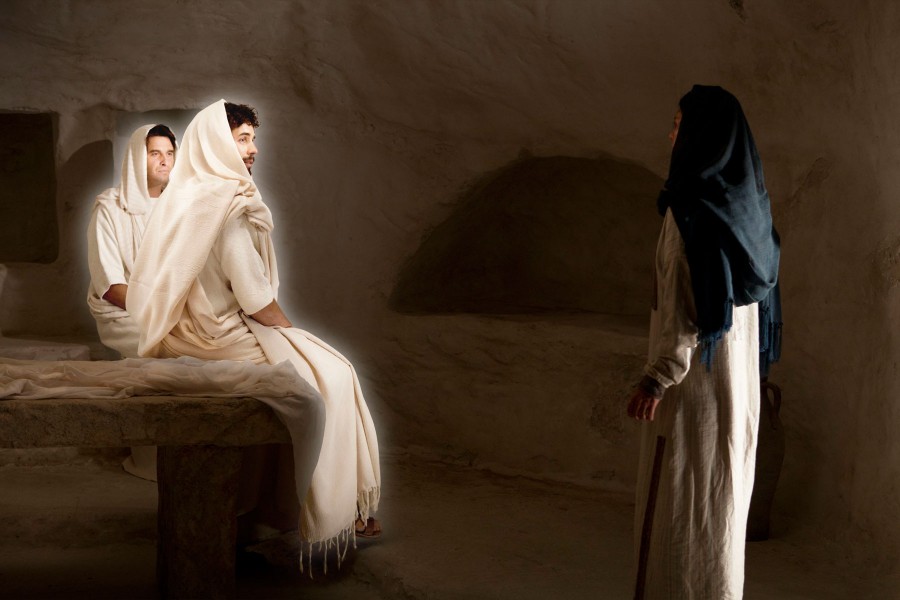The primary Greek word for sin is "hamartano" which literally means "to miss the mark". This mark refers to the standards set by our Creator to live a righteous or correct life. Ultimately it boils down to obedience. To obey God consistently is the goal of life. To disobey God is to miss the mark or, in the vernacular, to make a mistake. Men who sin (make mistakes) must pay the penalty.
I Cor 15:56 The sting of death is sin; and the strength of sin is the law.
The Law defines the do's and dont's men are to live by. Missing a mark (making a mistake) set by the Law gives sin power --- the power to put men to death. The penalty of sin is death. Since all men are sinners all men are held captive by the Law and sentenced to death.
The Greek word for death is "thanatos". It means "separation". Separation from God is not physical but spiritual. This is made obvious when we look at the death of Adam. Adam disobeyed God but he did not die physically. Rather he was separated spiritually from God. He no longer shared walks or had direct fellowship with God. This resulted in the corruption and decay of Adam's soul which occurred over time. This separation also affected Adam's physical body and it was quite a while before Adam experienced physical death, i.e. the separation of his soul and spirit from his body so his body became lifeless.
The work of Jesus Christ reconnects a person's spirit with God's spirit. Repentance, baptism and receiving the Holy Spirit mark the beginning of a renewal process, i.e. a renewal of the soul.
The work of Jesus Christ also redeems men in two ways. One Greek word for redemption comes from a verb luo which means to loosen or nullify or void. The concept of divorce comes from this Greek word and means the end or voiding of a contract. The sacrifice of Jesus, i.e. His blood, erases all the mistakes a person has ever made and thus ends or nullifies or voids the contract with Law. By releasing people from the contract of Law Jesus nullifies or voids the strength of sin to put people to death.
The other Greek word for redemption comes from the word agora which means "marketplace". What do we do in a marketplace? Some sell and some buy. In this case the Law is the seller. The Law is selling mankind. Jesus is the buyer. The Law only accepts blood for payment (not money). So Jesus gave His blood to buy all of mankind. Jesus owns everyone!
When you read an English translation of the New Testament you will never understand the difference between these two Greek words or which word is used in which verse.
Jesus changes the whole process for dealing with sin. To deal with sin required the shedding of blood. The Jews were instructed by God to use the blood of innocent animals to pay for a person's sins. This is atonement which only covers sin and had to be accomplished frequently for the people and once a year for the nation.
The blood of Jesus is NOT atonement.
Jesus sacrificed His innocent blood which God uses to wash away a person's sins. Once those sins are washed away they are forgotten. This is propitiation, i.e His blood removes and replaces sin. And His single sacrifice lasts forever.
I Peter 2:19 For this is thankworthy, if a man for conscience toward God endure grief, suffering wrongfully. 20 For what glory is it, if, when ye be buffeted for your faults, ye shall take it patiently? but if, when ye do well, and suffer for it, ye take it patiently, this is acceptable with God.
In verse 20 the word translated "faults" is really a present tense verb that means "committing sin" or "making mistakes". These mistakes are usually unintentional but when you make mistakes you can expect to have problems. Putting up with these problems is not a great sacrifice since you created the problems youself. It is important to ask God for forgiveness but it is even more important to ask the one you have offended for forgiveness. When you suffer for doing right and take it patiently without anger or stikinig back is when you are doing that God wants.
Hebrews 10:26 For if we sin wilfully after that we have received the knowledge of the truth, there remaineth no more sacrifice for sins, 27 But a certain fearful looking for of judgment and fiery indignation, which shall devour the adversaries.
Paul takes this a step further and speaks of wilfull sinning. If you do something you know is wrong ON PURPOSE the sacrifice of Jesus will NOT pay for your sin. YOU will pay for your sin. What is the payment for sin? Separation from God and possible fiery indignation!
James 4:17 Therefore to him that knoweth to do good, and doeth it not, to him it is sin.
James takes another step to identify sins of omission. If you know what you are supposed to do and DON'T DO IT that is missing the mark set by God.
I Peter 4:1 Forasmuch then as Christ hath suffered for us in the flesh, arm yourselves likewise with the same mind: for he that hath suffered in the flesh hath ceased from sin; 2 That he no longer should live the rest of his time in the flesh to the lusts of men, but to the will of God.
Peter sets the bottom line. Just as Jesus suffered in the flesh we are to suffer in the flesh. If we are willing to suffer we will stop making mistakes. Our goal is to no longer live to please self by doing what the flesh wants but live to do the will of God. This is what discipleship is all about.
I Cor 15:56 The sting of death is sin; and the strength of sin is the law.
The Law defines the do's and dont's men are to live by. Missing a mark (making a mistake) set by the Law gives sin power --- the power to put men to death. The penalty of sin is death. Since all men are sinners all men are held captive by the Law and sentenced to death.
The Greek word for death is "thanatos". It means "separation". Separation from God is not physical but spiritual. This is made obvious when we look at the death of Adam. Adam disobeyed God but he did not die physically. Rather he was separated spiritually from God. He no longer shared walks or had direct fellowship with God. This resulted in the corruption and decay of Adam's soul which occurred over time. This separation also affected Adam's physical body and it was quite a while before Adam experienced physical death, i.e. the separation of his soul and spirit from his body so his body became lifeless.
The work of Jesus Christ reconnects a person's spirit with God's spirit. Repentance, baptism and receiving the Holy Spirit mark the beginning of a renewal process, i.e. a renewal of the soul.
The work of Jesus Christ also redeems men in two ways. One Greek word for redemption comes from a verb luo which means to loosen or nullify or void. The concept of divorce comes from this Greek word and means the end or voiding of a contract. The sacrifice of Jesus, i.e. His blood, erases all the mistakes a person has ever made and thus ends or nullifies or voids the contract with Law. By releasing people from the contract of Law Jesus nullifies or voids the strength of sin to put people to death.
The other Greek word for redemption comes from the word agora which means "marketplace". What do we do in a marketplace? Some sell and some buy. In this case the Law is the seller. The Law is selling mankind. Jesus is the buyer. The Law only accepts blood for payment (not money). So Jesus gave His blood to buy all of mankind. Jesus owns everyone!
When you read an English translation of the New Testament you will never understand the difference between these two Greek words or which word is used in which verse.
Jesus changes the whole process for dealing with sin. To deal with sin required the shedding of blood. The Jews were instructed by God to use the blood of innocent animals to pay for a person's sins. This is atonement which only covers sin and had to be accomplished frequently for the people and once a year for the nation.
The blood of Jesus is NOT atonement.
Jesus sacrificed His innocent blood which God uses to wash away a person's sins. Once those sins are washed away they are forgotten. This is propitiation, i.e His blood removes and replaces sin. And His single sacrifice lasts forever.
I Peter 2:19 For this is thankworthy, if a man for conscience toward God endure grief, suffering wrongfully. 20 For what glory is it, if, when ye be buffeted for your faults, ye shall take it patiently? but if, when ye do well, and suffer for it, ye take it patiently, this is acceptable with God.
In verse 20 the word translated "faults" is really a present tense verb that means "committing sin" or "making mistakes". These mistakes are usually unintentional but when you make mistakes you can expect to have problems. Putting up with these problems is not a great sacrifice since you created the problems youself. It is important to ask God for forgiveness but it is even more important to ask the one you have offended for forgiveness. When you suffer for doing right and take it patiently without anger or stikinig back is when you are doing that God wants.
Hebrews 10:26 For if we sin wilfully after that we have received the knowledge of the truth, there remaineth no more sacrifice for sins, 27 But a certain fearful looking for of judgment and fiery indignation, which shall devour the adversaries.
Paul takes this a step further and speaks of wilfull sinning. If you do something you know is wrong ON PURPOSE the sacrifice of Jesus will NOT pay for your sin. YOU will pay for your sin. What is the payment for sin? Separation from God and possible fiery indignation!
James 4:17 Therefore to him that knoweth to do good, and doeth it not, to him it is sin.
James takes another step to identify sins of omission. If you know what you are supposed to do and DON'T DO IT that is missing the mark set by God.
I Peter 4:1 Forasmuch then as Christ hath suffered for us in the flesh, arm yourselves likewise with the same mind: for he that hath suffered in the flesh hath ceased from sin; 2 That he no longer should live the rest of his time in the flesh to the lusts of men, but to the will of God.
Peter sets the bottom line. Just as Jesus suffered in the flesh we are to suffer in the flesh. If we are willing to suffer we will stop making mistakes. Our goal is to no longer live to please self by doing what the flesh wants but live to do the will of God. This is what discipleship is all about.





